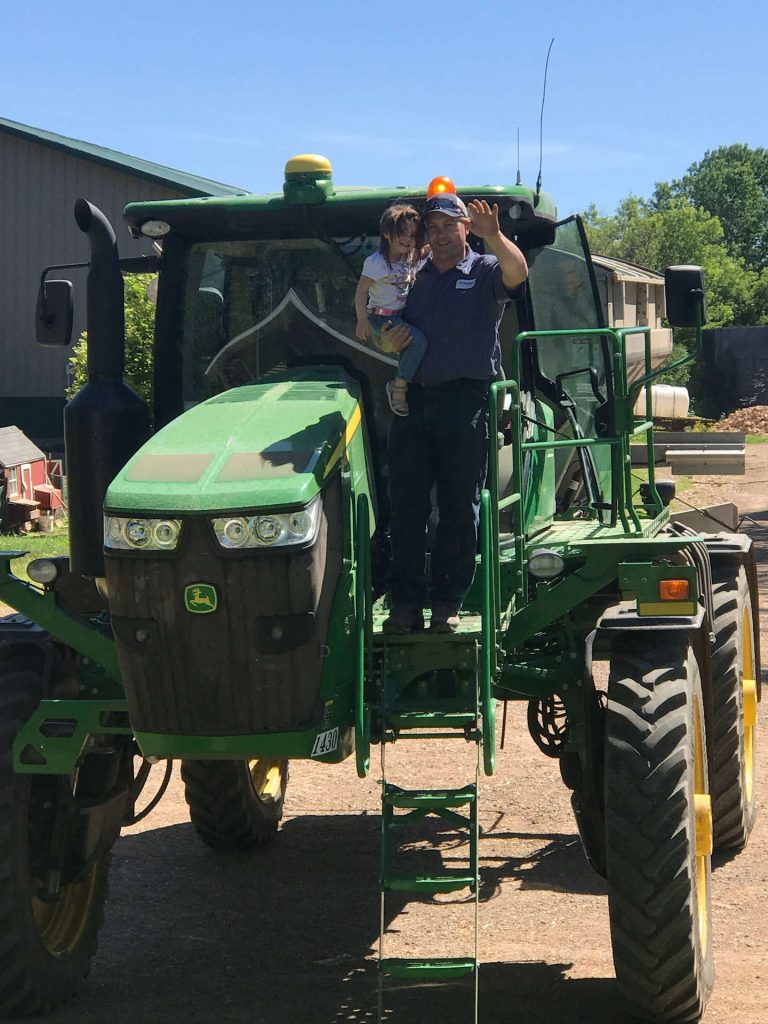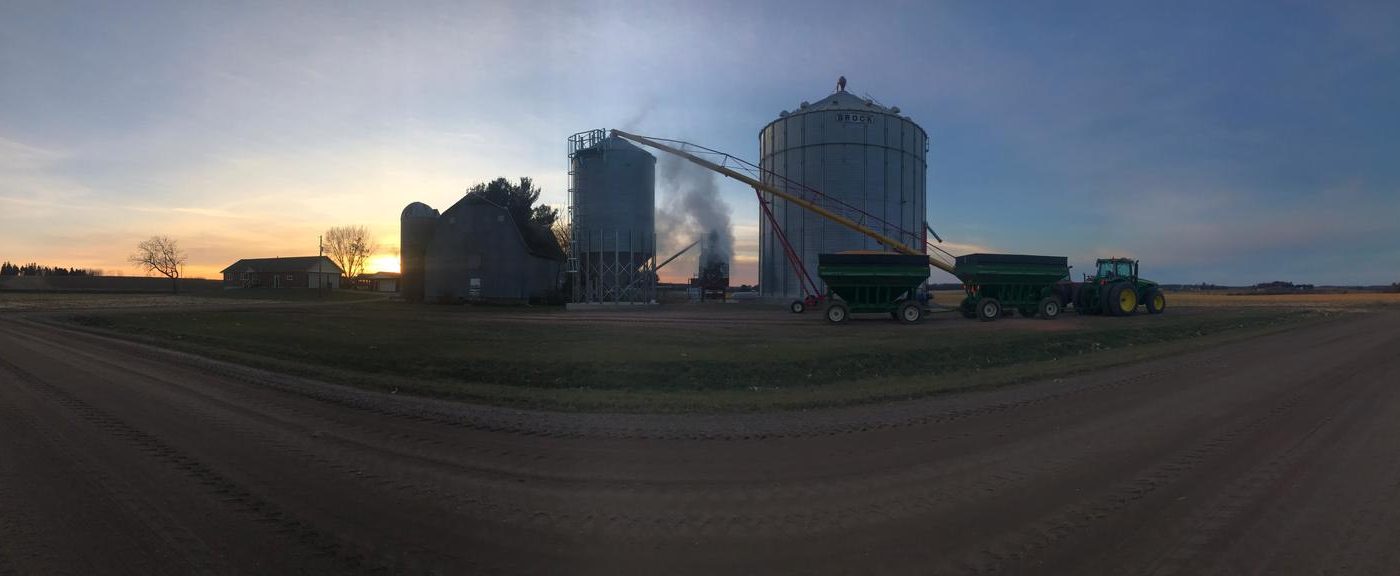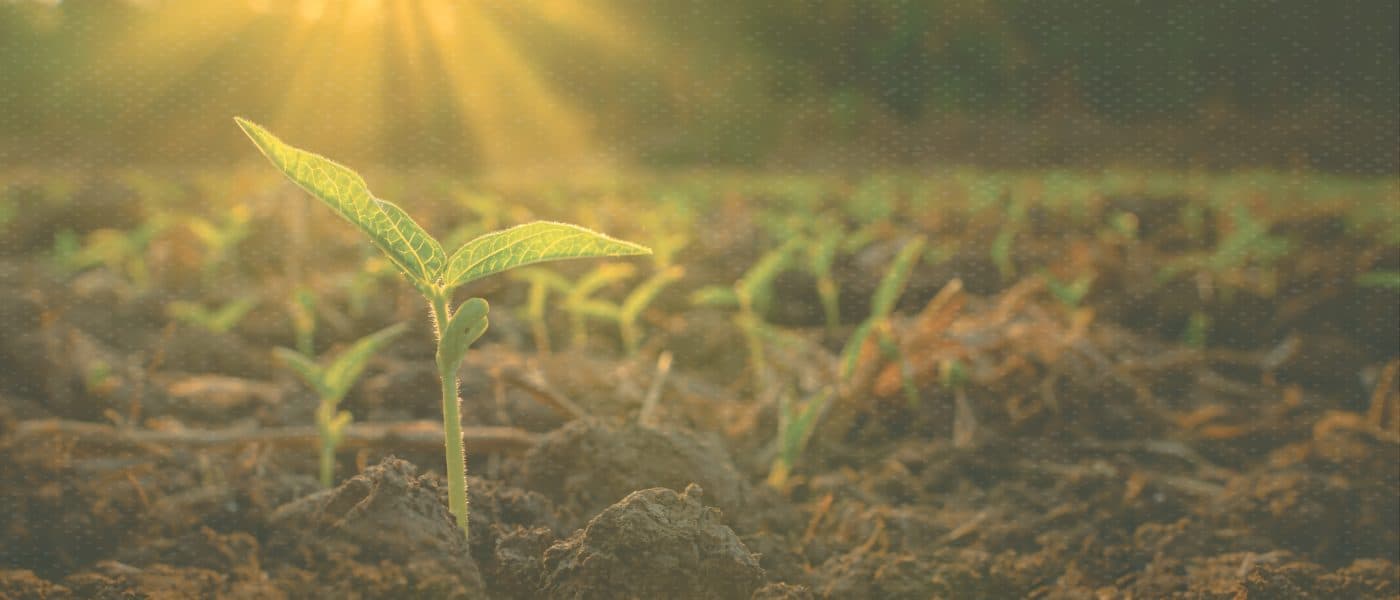This week we heard from Abe Voelker, the son of a Wisconsin dairy farmer, who shared his story, as he puts it, “On the death of my family’s dairy farm.” Farm Aid often receives stories like this, especially lately with dairy farms going out of business at a rate of one-and-a-half farms per day in Wisconsin. But Abe’s story is different. Abe’s grasp of the system that drives independent family farmers like his family to the brink—and over—is unusually eloquent and effectively told.
Abe emailed to let us know he listed Farm Aid as one of the organizations working to keep farmers on the land, and to thank Farm Aid for our work to do that since 1985. After reading his blog post, we immediately asked him if we could share it with our audience, to help our readers understand what it means for a family to make this heartbreaking decision and to understand the system that forces families to do it. Abe’s documentation of the trends and threats that family farmers have faced for decades—corporate power, bad prices, factory farm production—is spot-on and he tells it in a way that is compelling and easy to understand.
“I recall my dad saying how farming was a series of upturns and downturns in pretty much everything, and how it was important to save money from the good years so you can survive the bad years.”
Abe did not follow in his dad’s footsteps—he became a computer programmer—but it’s clear to see how growing up on a farm shaped him. Below we’ve excerpted a few passages from Abe’s post, and we encourage you to read the whole story. This is happening each and every day to farms of all kinds and sizes across the country, and though the family’s pain is the worst, we all suffer when families like Abe’s close the barn doors forever.
This Christmas, like every other, I traveled to northern Wisconsin to stay with my parents on the dairy farm I grew up on.
As usual I took the opportunity to help my dad and younger brother with barn chores and to milk cows. The cows need to be milked twice a day, every day, roughly around 4AM and 4PM. I didn’t help out every shift but I worked more than enough to once again be humbled about the life I left behind and recalibrate my nostalgia.
Sadly this year I found out that it will have been my final Christmas coming home and milking cows, because they’ll be selling off the cows over the coming spring and fall.
This probably shouldn’t be a huge shock. Ever since I can remember there has always been a steady drumbeat of family farms going bust. Sometimes the tempo would increase, when milk and/or crop prices would hit new lows, but the drum has always beat on as the industry never seemed to turn a corner.
Our family farm was subjected to the same ups and downs as every other farm but had always managed to weather every storm. I recall my dad saying how farming was a series of upturns and downturns in pretty much everything, and how it was important to save money from the good years so you can survive the bad years.
…
What’s now happening in the final stages to the American family dairy farm has already happened to other food and livestock industries in this country. Notably poultry, as poultry farmers nowadays are more or less serfs to a handful of huge corporations.
For a time some thought it would be possible for small dairy farms to escape to a niche like organic, but even those farms are going bust as the large corporate farms have penetrated that market and flooded it with product (even if they probably aren’t following the already-lax USDA regulations).
I do think it may have been possible to save the family dairy farm at some point, probably through a supply management program similar to what Canada has. There are all sorts of arguments to be made for or against such a system but by all accounts Canadian farmers and consumers are generally happy with their setup up there. The 2014 Farm Bill would’ve been a good start; it included an oversupply management mechanism, but CAFO lobbyist groups like the Dairy Business Association pushed a last-minute amendment to remove it.
But at this point for America, the cow is out of the barn so to speak and it’s too late for our family dairy farmers. As dairy farms continue to close at record levels, the consolidation into large corporate farms will continue unabated.
For a taste of what the near future looks like, Wal-Mart already began bottling their own milk, shutting down over 100 dairy producers in the process. As for the distant future, I imagine it will look similar to the consolidation in other livestock industries, where a handful of mega corporations dictate production and the “farmers” are more like serfs, deeply in debt and entirely beholden to the corporation. I already mentioned poultry farming, but also look at hog farming: the largest hog producer in the country, Smithfield Foods, is now owned by a Chinese corporation, and which is responsible for staggering amounts of damage to rural American communities due to the concentrated waste it produces.
In the name of efficiency, profits will be concentrated in fewer and fewer hands while waste gets concentrated into more and more toxic forms to be dumped on rural communities.
…

Abe Voelker’s brother, John, coming back from spreading fertilizer, holding his daughter. Photo © Abe Voelker
Growing up on a dairy farm is a very unique experience that I was fortunate to have. The farm was woven through all aspects of our family’s life, and the success of our family depended on everyone’s contribution to the farm. Family bonds were tempered by working with each other every day, and together overcoming the minor crises that arose (cows getting out, equipment breaking down, etc.). That’s why I used “death” in this article’s title; while it may seem melodramatic to some, that is what it feels like to me – like a piece of the family is dying.
You get a little taste of many things working on a farm, from agricultural, to construction (e.g. building and fixing up areas of the barn), to engineering (e.g. designing ad-hoc fixes to broken implements in the field), to mechanical and engine repair (e.g. fixing tractors and welding implements).
It saddens me that my brother Noah won’t be able to pass that legacy on to his daughter, and I can’t give my own kids a glimmer of it by having them work on the farm over the summers (and neither can my nieces or nephews).
It’s also a loss for Wisconsin’s culture – “America’s Dairyland” – that we aren’t going to have farm kids coming up any more, and our rural pastoral landscape that was dotted with barns, silos, and pastures with grazing cattle is being replaced by an industrial one with huge buildings, heavy machine traffic, and artificial lakes made of animal waste. Those of us who grew up in these rural areas and moved out but longed to return can’t even bear to do so any longer because the land has been blighted.
…
While the future is still uncertain for my kid brother Noah, I have no doubt he will succeed at whatever he puts his mind to. He’s got brains, talent, and a god-tier work ethic.
If there’s anything good to come of the situation, I am glad at least that he’ll be freed from the burden of having cows, which require one to be out in the barn every single day without end. It will also be a relief to my dad, who I mentioned earlier is now in his seventies and still has to work out in the barn every day because of the difficulty in hiring legal farmhands.
Whatever happens, these family bonds that were forged on the farm remain, and we will take care of each other.
…
Our thanks to Abe Voelker for sharing his story with us. We wish the Voelkers the best as they transition out of the proud tradition of dairy farming.
Please read the full post at Abe’s blog.



